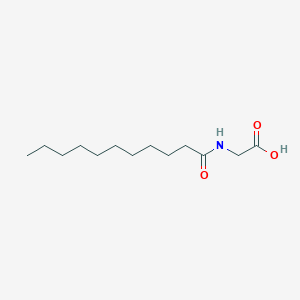| General Information of MET (ID: META00646) |
| Name |
N-Undecanoylglycine
|
| Synonyms |
Click to Show/Hide Synonyms of This Metabolite
2-Undecanamidoacetate; 2-Undecanamidoacetic acid; Acylglycine c:11; Undecanamidoacetate; Undecanamidoacetic acid; Undecanoylglycine
|
| Source |
Aliphatic acyclic compounds
|
| Structure Type |
Amino acids, peptides, and analogues (Click to Show/Hide the Complete Structure Type Hierarchy)
Organic acids and derivatives
Carboxylic acids and derivatives
Amino acids, peptides, and analogues
|
| PubChem CID |
|
| HMDB ID |
|
| Formula |
C13H25NO3
|
| Structure |
<iframe style="width: 300px; height: 300px;" frameborder="0" src="https://embed.molview.org/v1/?mode=balls&cid=454092"></iframe>
|
 |
|
3D MOL
|
2D MOL
|
|
Click to Show/Hide the Molecular/Functional Data (External Links/Property/Function) of This Metabolite
|
| ChEBI ID |
|
| FooDB ID |
|
| ChemSpider ID |
|
| Physicochemical Properties |
Molecular Weight |
243.34 |
Topological Polar Surface Area |
66.4 |
| XlogP |
3.8 |
Complexity |
217 |
| Heavy Atom Count |
17 |
Rotatable Bond Count |
11 |
| Hydrogen Bond Donor Count |
2 |
Hydrogen Bond Acceptor Count |
3 |
| Function |
N-Undecanoylglycine is an acylglycine with C-11 fatty acid group as the acyl moiety. Acylglycines 1 possess a common amidoacetic acid moiety and are normally minor metabolites of fatty acids. Elevated levels of certain acylglycines appear in the urine and blood of patients with various fatty acid oxidation disorders. They are normally produced through the action of glycine N-acyltransferase which is an enzyme that catalyzes the chemical reaction: acyl-CoA + glycine ↔ CoA + N-acylglycine.
|
|
Regulatory Network
|
|
|
|
|
|
|
|
|
 click to show the details of this protein
click to show the details of this protein
 click to show the details of experiment for validating this pair
click to show the details of experiment for validating this pair

